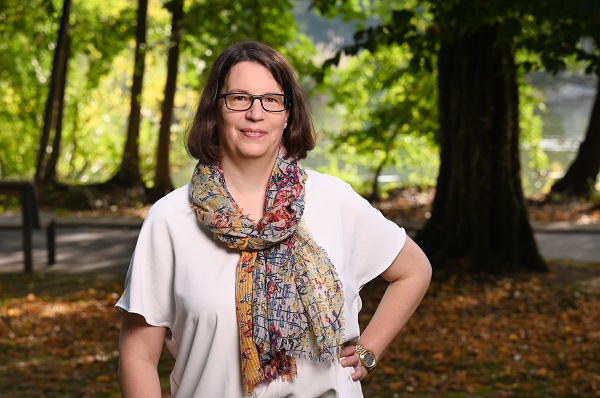As an experimental physicist, Kerstin Blank is on the quest for the building blocks of life.

Kerstin Blank is a new professor for experimental physics at the JKU, having recently moved to Upper Austria from Germany. We spoke with her about what she hopes do here and why can put herself in her students’ shoes.
What is your area research?
Kerstin Blank: Biological systems evolve and have developed a variety of mechanisms to manage their mechanical properties or respond to mechanical signaling. My research group focuses on which molecules are responsible for this and how they work. On one hand, we use what we learn to better understand biology. On the other hand, we use these kinds of molecular building blocks to create innovative, bioinspired systems that can heal mechanical defects themselves, or even generate an optical signal to visualize these kinds of defects.
Why did you choose the JKU?
Kerstin Blank: My research is very interdisciplinary, containing elements in physics, biology, chemistry, and materials science. There are many opportunities to communicate and work with groups in these areas here at the JKU. I look forward to working with my new colleagues and advancing my ideas together.
What do you find particularly fascinating about this area?
Kerstin Blank: I find discussions with colleagues, employees, and students from different fields and backgrounds to be extremely exciting and tremendously inspiring. I find that bringing expertise in various areas together is fascinating, along with combining methods and addressing scientific questions together. I continue to learn something new every day.
Why is this research even necessary, meaning how will it improve our lives?
Kerstin Blank: We are realizing more and more that mechanical processes are playing a role when it comes to illness and diseases. For example, when looking at cancer and cardiovascular diseases, mechanical tissue properties change and we need to better understand the molecular mechanisms in order to be able to create an intervening, targeted approach. The molecular building blocks my research group studies may also be applied to completely different area of our lives. As our building blocks are natural in origin, in the future, we want to use them more to produce intelligent and sustainable materials.
Why should students take your classes?
Kerstin Blank: As I work with students and researchers in different disciplines every day, I’ve learned to put myself in their shoes. I believe this is a strong basis to explain complex relationships in a straightforward way. I also believe it is very important to not only be able to teach the material, but also the skills needed to be professionally successful - whether in research or elsewhere.
What are you currently working on?
Kerstin Blank: Together with my research group, we are currently focusing on protein-based molecular force sensors. We want to use them to measure just how much force a single cell can exert, for example, when it moves along a surface.
What are your hobbies?
Kerstin Blank: I love the outdoors, whether hiking, sailing, or gardening. I often take my camera with me as well. This not only helps me switch off and recharge, but it sparks new ideas as well. I look forward to exploring Linz and the surrounding areas.
What else do you want to do or achieve in your life?
Kerstin Blank: Austria is now the seventh country I’ve worked in over the course of my career. I have experienced a lot in each country and have met interesting people. Unfortunately, once you move, you lose touch with many people. I would like to settle more in Linz, personally and professionally, foster old and new friendships, but still continue to travel and explore the world.
About Prof. Dr. Kerstin Blank
Born on February 1, 1974 in Ochsenfurt, Germany, Prof. Dr. Kerstin Blank studied biotechnology at the University of Applied Sciences Jena and conducted research for her Diploma degree thesis at the University of Zurich. After working at the start-up nanotype company for two and a half years, she returned to academia and completed her doctorate degree in biophysics at Ludwig-Maximilians-Universität in Munich. After two post-doc stays at universities in Strasbourg and Leuven, Kerstin Blank became an Assistant Professor at Radboud University in Nijmegen. During this period, conducted research at Oregon State University in Corvallis. Most recently, she was a Max Planck Research Group Leader at the Max Planck Institute of Colloids and Interfaces in Potsdam.








